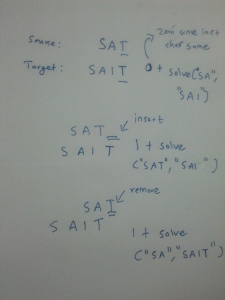Problem link: http://www.spoj.com/problems/ONEZERO/
Suppose the number that you want is X. X mod N = 0.
So you need to store only N states i.e. 0 to n-1. Start with 1.
Implement bfs approach. If the current state modulo is Y, append 0 to it i.e calculate Y*10 + 0 and find its modulo which will lead you to a new modulo state.
Similary append 1 to Y. i.e calculate Y*10 + 1 and find its modulo.
Example: if Y=11 append 0 to it to get 110 and append 1 to Y to get 111.
Have a parent array which will store the previous modulo state from which the current modulo state is reached. This parent array also acts as checkpoint to check if a modulo state is already visited or not.
Have a value array to store the value (1 or 0) that is appended to the parent modulo state to get the current modulo state.
Once the modulo state 0 is reached stop bfs and backtrack using parent array and value array to get the number (i.e smallest multiple of the number n consisting only of digits 1 and 0 beginning with 1).
| #include <vector> | |
| #include <list> | |
| #include <map> | |
| #include <set> | |
| #include <deque> | |
| #include <queue> | |
| #include <stack> | |
| #include <string> | |
| #include <bitset> | |
| #include <algorithm> | |
| #include <functional> | |
| #include <numeric> | |
| #include <utility> | |
| #include <sstream> | |
| #include <iostream> | |
| #include <iomanip> | |
| #include <cstdio> | |
| #include <cmath> | |
| #include <cstdlib> | |
| #include <ctime> | |
| #include <cstring> | |
| #include <climits> | |
| #include <stdlib.h> | |
| #include <stdio.h> | |
| using namespace std; | |
| #define REP(i,n) for(int i=0; i<n; i++) | |
| #define FOR(i,st,end) for(int i=st;i<end;i++) | |
| #define db(x) cout << (#x) << " = " << x << endl; | |
| #define mp make_pair | |
| #define pb push_back | |
| #define mod 1000003 | |
| int parent[20005]; | |
| typedef long long int ll; | |
| queue<int>q; | |
| int temp,currentState; | |
| int value[20005]; | |
| void solve(int n){ | |
| q.push(1); | |
| parent[1]=0; | |
| while(!q.empty()){ | |
| currentState=q.front(); | |
| q.pop(); | |
| if(currentState==0){ | |
| stack<int> s; | |
| while(parent[currentState]){ | |
| s.push(value[currentState]); | |
| currentState=parent[currentState]; | |
| } | |
| s.push(1); | |
| while(!s.empty()){ | |
| printf("%d",s.top()); | |
| s.pop(); | |
| } | |
| printf("\n"); | |
| break; | |
| } | |
| temp=(currentState*10)%n; | |
| if(parent[temp]==-1){ | |
| q.push(temp); | |
| parent[temp]=currentState; | |
| value[temp]=0; | |
| } | |
| temp=currentState*10+1; | |
| temp%=n; | |
| if(parent[temp]==-1){ | |
| q.push(temp); | |
| parent[temp]=currentState; | |
| value[temp]=1; | |
| } | |
| } | |
| } | |
| int main(){ | |
| int t,n; | |
| scanf("%d",&t); | |
| while(t--){ | |
| while(!q.empty()){ | |
| q.pop(); | |
| } | |
| REP(i,20000) | |
| parent[i]=-1; | |
| scanf("%d",&n); | |
| solve(n); | |
| } | |
| } |

